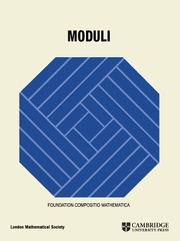In partnership with the Foundation Compositio Mathematica, the London Mathematical Society and Cambridge University Press, we are pleased to announce the first issue of the new open-access journal Moduli.
First introduced by Riemann in reference to the number of parameters needed to describe complex structures on a surface, the terms "moduli" and "moduli theory" now constitute a fundamental topic that shows up in different forms across much of modern mathematics. Moreover, instances abound where ideas in moduli theory have crossed traditional boundaries to spectacular effect. A key motivation for creating Moduli is precisely to facilitate such interdisciplinary collaboration by providing a common forum for important mathematical developments related to all facets of moduli theory.
Our journal welcomes high-quality, original research papers addressing moduli theory from all perspectives, including algebraic, differential, and arithmetic geometry; combinatorics; dynamical systems; gauge theory; geometric analysis; geometric group theory; mathematical physics; representation theory; and topology. The journal is supported by an editorial board of leading researchers whose collective expertise covers the scope of the journal. The papers in this first issue of Moduli involve, for example, techniques from enumerative geometry, gauge theory, mirror symmetry, the study of integrable systems, tropical geometry, cohomological field theories, birational geometry (including in positive characteristics) and the minimal model program. They illustrate both the intended scope and standard of the journal.
An important part of our vision is that Moduli is an open-access journal that is free to read. To that end, together with the LMS and CUP we have agreed on a sustainable publishing model in which authors who can access funds to pay an article-processing charge are requested to contribute to the costs of running the journal, but no author is obliged to pay such a charge.
We hope that Moduli will not only record and disseminate advances across all areas where moduli theory plays a role but will also be part of active efforts to promote connections amongst different sub-communities. These efforts will include a series of workshops and summer programs specifically designed to combine different aspects of moduli theory. The first such activity, contemporaneous with the launch of the first issue, is a three-week Math Summer Workshop on Moduli at the Simons Center for Geometry and Physics in July 2024. As part of the workshop, we will have an official launch to celebrate Moduli, with several authors from the first issue speaking at this event.
We invite the mathematical community to support this new journal by considering submitting their work to Moduli.
The Managing Editors of Moduli


